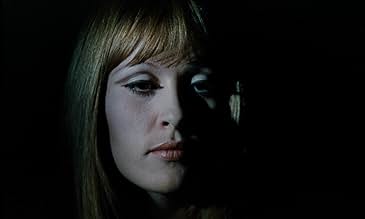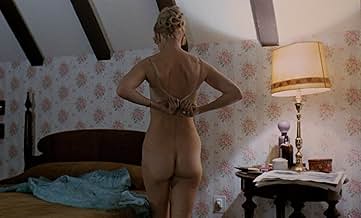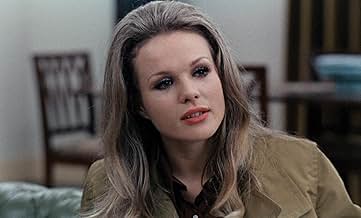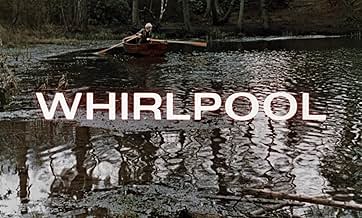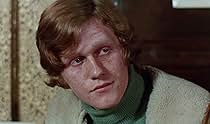A rich older woman living in a country house brings home a new model to be photographed by a young enigmatic photographer who lives with her. The unsuspecting girl becomes entangled in a web... Read allA rich older woman living in a country house brings home a new model to be photographed by a young enigmatic photographer who lives with her. The unsuspecting girl becomes entangled in a web of sex, abuse and death.A rich older woman living in a country house brings home a new model to be photographed by a young enigmatic photographer who lives with her. The unsuspecting girl becomes entangled in a web of sex, abuse and death.
- Director
- Writers
- Stars
- Director
- Writers
- All cast & crew
- Production, box office & more at IMDbPro
Featured reviews
"Whirlpool" follows a British model who is lured to an older woman's picturesque country estate where a young male photographer, whom she refers to as her nephew (and she, his aunt), reside. Things seem odd at first, but they only get worse and worse.
The first feature from José Ramón Larraz, "Whirlpool" contains many of the director's early stylistic hallmarks: dreary woods, picturesque country homes, sexual repression galore, clueless fashion models, and a mean-spirited edge as blunt as a dull knife. His more well-known early feature, "Symptoms", would further expound on ideas and themes present in "Whirlpool", and perhaps more elegantly; and his third feature, "The House That Vanished", boasts a similar setting and premise. That being said, there is no less a grisly allure to this film that is unmistakable.
Narratively speaking, one has to suspend disbelief on occasion for this film to really work (for example, the protagonist, Tulia, accepts the invitation to the country house despite the fact that one of her model cohorts disappeared after visiting some weeks before). That being said, one could view the film as something of a cautionary tale warning against the dangers of naiveté, where the Tulia character becomes something of a Hansel & Gretel figure, drawn into this web by her own imperviousness. The film is slow-going early on and tends to drag in the middle, as the perverse relationship between the "nephew" and "aunt" characters comes into clearer view. In the end, though, it all hurtles toward a nasty conclusion that feels inspired by Ingmar Bergman's "The Virgin Spring", and strangely predicts the type of violence in Wes Craven's reimagining of that film, "The Last House on the Left", which was released two years after "Whirlpool".
All in all, this is a moody and bitter film that, despite its fairly single-note story, manages to pack a few knives to the gut. If nothing else, "Whirlpool" serves as the stylistic template for which Larraz would base his subsequent features. 7/10.
The first feature from José Ramón Larraz, "Whirlpool" contains many of the director's early stylistic hallmarks: dreary woods, picturesque country homes, sexual repression galore, clueless fashion models, and a mean-spirited edge as blunt as a dull knife. His more well-known early feature, "Symptoms", would further expound on ideas and themes present in "Whirlpool", and perhaps more elegantly; and his third feature, "The House That Vanished", boasts a similar setting and premise. That being said, there is no less a grisly allure to this film that is unmistakable.
Narratively speaking, one has to suspend disbelief on occasion for this film to really work (for example, the protagonist, Tulia, accepts the invitation to the country house despite the fact that one of her model cohorts disappeared after visiting some weeks before). That being said, one could view the film as something of a cautionary tale warning against the dangers of naiveté, where the Tulia character becomes something of a Hansel & Gretel figure, drawn into this web by her own imperviousness. The film is slow-going early on and tends to drag in the middle, as the perverse relationship between the "nephew" and "aunt" characters comes into clearer view. In the end, though, it all hurtles toward a nasty conclusion that feels inspired by Ingmar Bergman's "The Virgin Spring", and strangely predicts the type of violence in Wes Craven's reimagining of that film, "The Last House on the Left", which was released two years after "Whirlpool".
All in all, this is a moody and bitter film that, despite its fairly single-note story, manages to pack a few knives to the gut. If nothing else, "Whirlpool" serves as the stylistic template for which Larraz would base his subsequent features. 7/10.
I saw this in the theater way back when.My memory fails over the years but I wish I could see it again.I remember it as a slezzy sort of teasing film except for the ending.Thats what made the film and why so many try to find it today.Alas with no luck.If you can find it,tell the WORLD!!
This is the first film of the cult Spanish expatriate director Jose Larraz (which was lost until very recently). It is far more amateurish than his later (and better) films like "Symptoms", "Vampyres", and "The Coming of Sin", but it has the same basic themes--omnivorous sexual perversity played out against a background of haunting natural beauty. A Swinging London era fashion (played by Vivian Neves, who was a, um, Swinging London Era fashion model)is lured to an isolated country estate by a creepy older woman to meet her even creepier photography-obsessed nephew. She doesn't seem too perturbed to learn that a previous female model that went there has disappeared without a trace, nor does she find it strange that her first night there the aunt and nephew get her drunk and engage her in perverse game of strip poker. She almost has sex with the nephew (while his aunt secretly watches) but he isn't able to, uh, rise to the occasion. The next day he takes her into town and pays a friend to rip her clothes off and nearly rape her while he takes pictures. This doesn't seem to bother her either because soon she's involved in another bisexual three-way sex/photography session with the aunt and nephew. There is also an allusion to the old Bluebeard story--the model has been forbidden to enter the nephew's mysterious darkroom. Hmmmm. Guess what she does?
This movie was written off as a cheap sex movie when it was released, even though it doesn't really contain any more sex than any other Larraz movie. The problem is that just isn't very good. It kind of reminded of the sexy Italian giallo "Amuck!" released a few years later, but it lacks both the strong acting and the directorial flair of that movie. It's also hard to muster much sympathy for the protagonist as she is unbelievably stupid. And there's no doubt from the beginning that the villainous couple are the worst kind of creeps (and the actors that play them might as well be twirling their mustaches). You can see the ending coming from a mile away--the tagline and the alternative title pretty much give it away. There is also a really lame voice-over coda before the end credits, which was no doubt added to ameliorate the censors. Still this IS a J.R. Larraz movie, so it is not entirely uninteresting and worth seeing if you're a fan of the director like I am.
This movie was written off as a cheap sex movie when it was released, even though it doesn't really contain any more sex than any other Larraz movie. The problem is that just isn't very good. It kind of reminded of the sexy Italian giallo "Amuck!" released a few years later, but it lacks both the strong acting and the directorial flair of that movie. It's also hard to muster much sympathy for the protagonist as she is unbelievably stupid. And there's no doubt from the beginning that the villainous couple are the worst kind of creeps (and the actors that play them might as well be twirling their mustaches). You can see the ending coming from a mile away--the tagline and the alternative title pretty much give it away. There is also a really lame voice-over coda before the end credits, which was no doubt added to ameliorate the censors. Still this IS a J.R. Larraz movie, so it is not entirely uninteresting and worth seeing if you're a fan of the director like I am.
I have always enjoyed the idiosyncratic films of Jose Ramon Larraz but have never before seen this, his first of a run of films made in England, although this one seems to have had Danish connections. In common with the director's others this is well shot with attractive settings, well lit and with very effective editing and musical score. The thing is, with everything indicating a well put together and artistic enterprise, there is much sex and a certain awkwardness, a certain embarrassment. Usually, as here that slightly off putting element gradually works for the film, balancing the artiness with an almost blunt form of realism. In Whirlpool a strange young man (Karl Lanchbury) and his aunt (Pia Andersson) have a passion for leading young ladies astray and in particularly into a bout of three in a bed. There are complications that include a flute player of pension age, a drug dealer with a yen for rape and the aforementioned aunt who has a an for young girls. Throughout all this a young beauty played by the young beauty Viven Neves shines brightly and seems up for anything. She gets a little more than she bargained for but then doesn't this always seem to happen in a Larraz film? Kim Newman refers to his films as 'glum', a very English expression for the work of a fine Spanish director who just didn't seem to want to make films the way others did.
Do you know that numb feeling of watching a movie and, after about 35-40 minutes into it, you suddenly realize that nothing - absolutely nothing - even remotely interesting or exciting has happened so far? "Whirlpool" gave me that annoying feeling. There's a creep rowing in a canoe for an awfully long time, and an uptight wealthy 40-something woman is parading around in her mansion. That about covers the first quarter. The two apparently live together as aunt and nephew (yeah, sure) and they are both deviant pervs. The aunt is a lesbian with a fetish for luring naïve fashion models to the house, and the nasty nephew photographs them. They all play strip poker together, and the pretty model is too unfathomably stupid to leave even though she gets humiliated, or simply because these two persons are utter loonies!
"Whirlpool" was the first long-feature film of the Spanish born José Ramón Larraz and enjoys somewhat of a cult status because it was presumed lost for several years. Well, I'm a big fan of Larraz and deeply admire several other films he made, but "Whirlpool" could have remained lost as far as I'm concerned. It's unpleasant, but not in a way that uncanny & gritty 70s exploitation flicks should be unpleasant. It's insufferably dull and slow-paced, and not at all compelling because you don't care for any of the characters. Vivian Neves, for example, is truly gorgeous - but with her clothes on and without - but her character is so incredibly naïve and brainless that you can't cheer for her. Regarding J. R. Larraz' resume, I can highly recommend "Vampyres", "Symptoms", "Rest in Pieces" and "Edge of the Axe". Even "The House that Vanished", "La Muerta Incierta", and "The Coming of Sin" are worthwhile, but this one (and "Deadly Manor") are quite worthless.
"Whirlpool" was the first long-feature film of the Spanish born José Ramón Larraz and enjoys somewhat of a cult status because it was presumed lost for several years. Well, I'm a big fan of Larraz and deeply admire several other films he made, but "Whirlpool" could have remained lost as far as I'm concerned. It's unpleasant, but not in a way that uncanny & gritty 70s exploitation flicks should be unpleasant. It's insufferably dull and slow-paced, and not at all compelling because you don't care for any of the characters. Vivian Neves, for example, is truly gorgeous - but with her clothes on and without - but her character is so incredibly naïve and brainless that you can't cheer for her. Regarding J. R. Larraz' resume, I can highly recommend "Vampyres", "Symptoms", "Rest in Pieces" and "Edge of the Axe". Even "The House that Vanished", "La Muerta Incierta", and "The Coming of Sin" are worthwhile, but this one (and "Deadly Manor") are quite worthless.
Did you know
- TriviaThe film disappeared for several decades until Arrow Video restored it and re-released it on Blu-ray in 2019.
- GoofsDuring the striptease card game, the bottle of liquor moves from one side of the table to the other, in back-to-back shots. Also, the amount of liquor in the bottle goes from half-full to nearly empty.
- Alternate versionsBritish censors cut lesbian sex scenes between Tulia and her aunt, a woodland rape, and a bedtime threesome.
- ConnectionsReferenced in Drive-in Movie Memories (2001)
- How long is Whirlpool?Powered by Alexa
Details
- Release date
- Countries of origin
- Language
- Also known as
- Déviations sexuelles
- Filming locations
- England, UK(location)
- Production company
- See more company credits at IMDbPro
Contribute to this page
Suggest an edit or add missing content


